A booklet was issued in 1978 for people interested in becoming Technical Operators in the Control Room at Broadcasting House.
INTRODUCTION
The BBC has gained an enviable reputation for consistently attaining the highest broadcasting standards and most, if not all the programmes produced are available in virtually every home in the United Kingdom. Less well known perhaps is the work of the BBC Technical staff whose expertise makes this possible.
The purpose of this booklet is to describe the work of one group of Technical staff - TECHNICAL OPERATORS in RADIO - and attempts to answer some of the many questions which you might have.
THE WORK OF RADIO TECHNICAL OPERATIONS
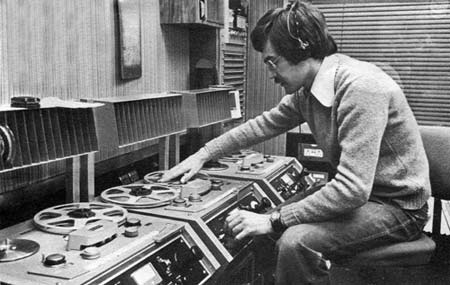
Setting up a tape machine prior to transmission.
In addition, Regional and Local broadcasting centres sited throughout the country, together with temporary locations and radio cars can all provide broadcasting material for the national networks.
The material from these 'sources' as they are called has to be arranged into a predetermined order and then 'streamed' into one of the four familiar Radio Networks to be fed to the appropriate transmitters.
This task of collection, assembly, monitoring and routing radio programmes is carried out in London Control Room (LCR) Broadcasting House, the 'nerve centre' of Radio Broadcasting and it is here where the Technical Operator, Radio can be found.
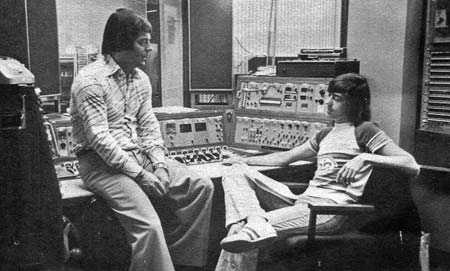
Discussion of programme details during rehearsal.
Often, the continuity suite acts as a studio it self; this being especially true of Radio 1. In this situation, the Technical Operator works together with the announcer or 'disc-jockey' in the presentation of the programme
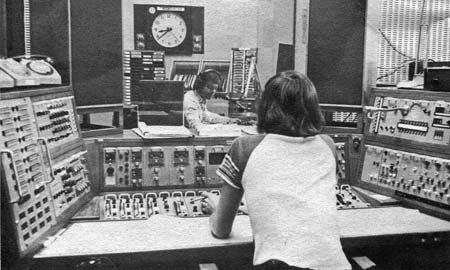
The same team during programme transmission.
The Technical Operator is responsible for the technical standard of the programme leaving the continuity on route to the transmitter and must be able to assess quickly the technical quality of a transmission and be able to take prompt remedial action when it is necessary.
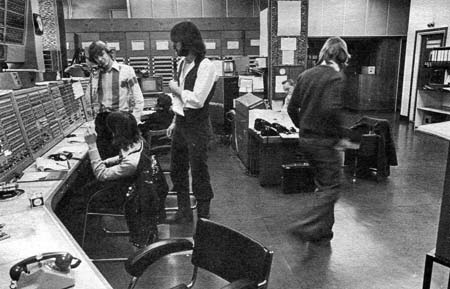
The Central Control Room area.
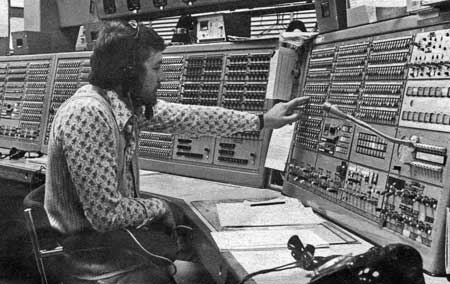
Solving a problem on the Transmitter Distribution Network.
At all stages, the technical quality of programmes must be maintained at the highest level and an essential requirement of the job is the ability to assess the technical excellence of high quality sound and to analyse possible causes in the event of any deterioration, bearing in mind that most programme material is produced in stereo and transmitted on the FM/VHF networks which is capable of providing extremely high quality sound at the listener's receiver.
QUALIFICATIONS
with considerable operational dexterity. Appreciation of hi-fi sound is essential and a general awareness of the technical background to some aspects of radio broadcasting such as tape-recording, or electronic/ hi-fi construction would be an advantage, as would a personal interest in the programme content of Radio Output - such as 'pop' or serious music.
The distribution of programme signals is dependent on the use of complex switching systems and an interest in this aspect of the work should certainly be present initially as at a fairly early stage of progress an aptitude to understand these complex systems is essential.
Applications will be considered from men and women with normal hearing and colour vision, who have 'O' Level passes, or the equivalent, in English Language, Mathematics and Physics and who will be 18 on or before the date of joining.
TRAINING AND PROSPECTS
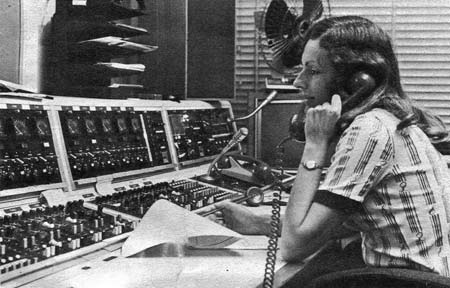
A Technical Operator in the News intake area
passing essential information to the studio.
passing essential information to the studio.
After the satisfactory completion of the first year of service, appointment will be confirmed. In the third year of service, Technical Operators undertake a further formal training course at Wood Norton and consideration for promotion to the next higher grade of Technical Operator will be given after completion of three years service, provided this course and further operational tests have been concluded satisfactorily. Further progress is on merit and subject to vacancies after 4½ years service.
CONDITIONS OF SERVICE
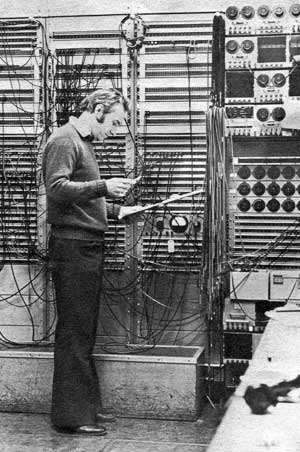
Setting up equipment for the transmission or recording of an outside broadcast.
In addition to public and special Corporation holidays, staff are entitled to 4 weeks annual leave.
There is a contributory pension scheme which staff (over 21) may join immediately upon recruitment, but which they are expected to join on confirmation of their appointment.
Facilities provided at Broadcasting House and at the Training Centre include staff restaurants, and at small cost, staff may join the BBC Club, which provides a wide range of social, sporting, artistic and other specialised activit ies.

